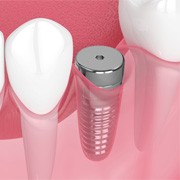Dental Implants – Mt. Pleasant, WI
A Tooth Replacement Like No Other
When you lose a tooth, you don’t just have an empty space in your smile. You also lose the tooth’s root structure that supports your jawbone. As a result, your jawbone begins to weaken and harm your oral health over time. Dental implants in Mt. Pleasant are the only tooth replacement that stops this process, because unlike dentures and dental bridges, implants replace the root in addition to the visible crown. Once placed, you can expect dental implants to look and feel natural for decades to come. Best of all, we can handle the entire dental implant process from start to finish here at Sweet Smiles Family Dentistry. Call us today to get started!

Why Choose Sweet Smiles Family Dentistry for Dental Implants?
- Dental Implants Conveniently Placed & Restored In-House
- CT/Cone Beam Scanner for Precise Treatment Planning
- Fair Prices with No Surprise Fees
What Are Dental Implants?

There are actually three parts to a dental implant, but the actual implant is a small titanium post that is surgically placed in the jaw to act as the new tooth’s root. The other components are the restoration (dental crown, bridge, or denture) that recreates the visible portion of the tooth and the abutment, which is a metal attachment that connects the restoration to the implant.
In short, dental implants mimic the entire structure of missing teeth – something that no other tooth replacement can do. This enables them to look, feel, and function more like your natural pearly whites than any other solution!
The 4-Step Dental Implant Process

At many general dental practices, patients are referred to an outside specialist for the surgical portions of the treatment, but not at Sweet Smiles Family Dentistry. Thanks to our dentists’ advanced training, we can complete every phase of the treatment right here in our familiar office! While each patient’s experience will differ slightly, here’s a basic breakdown of the four steps in the dental implant process.
Initial Dental Implant Consultation

The first step when it comes to restoring your smile is attending a consultation with us. At this time, we will take a look at your smile and surrounding facial structures. This will help us to determine whether dental implants are a good option for you and how they should be placed in your mouth.
Some patients need to have preliminary procedures completed before getting dental implants, like bone grafting, gum disease treatment, and tooth extractions. After this, we can move forward to planning the rest of your treatment. During your consultation, we are also happy to walk you through the process so that you know exactly what to expect, including the timeline and cost.
Dental Implant Surgery

Next comes your dental implant placement surgery. After we numb your mouth with a local anesthetic, a small incision is made into the gum tissue to access your jawbone. The implants will then be placed at precise locations and angles. Lastly, your gums will be closed and protective caps will be placed over the implants’ posts to keep them safe during the healing process.
Dental Implant Osseointegration & Abutment

Over the next three to six months, the fusion process will take place between the implants and the jawbone. This process is called “osseointegration.” This allows for your implants to have a sturdy foundation so that your replacement teeth stay firmly in place. Once this process has been completed, we can place a metal abutment on the end of your implants.
Delivery of Dental Implant Restorations

A few weeks after your abutment teeth have been placed, your restoration should be ready. You can return to our office when you will receive your new crown, bridge, or dentures depending on the number of teeth that you are replacing. At that point, we will check to make sure that your bite is comfortable, and you will be sent on your way!
Benefits of Dental Implants

By choosing to replace your lost teeth with dental implants, you’ll enjoy several benefits that you couldn’t with traditional dentures and bridges. For example, dental implants:
- Can last for 30+ years or even longer.
- Are very easy to care for – just brush and floss as you would with natural teeth.
- Stay in place at all times.
- Restore your chewing power, making it easier to eat your favorite foods.
- Look and feel natural.
- Stimulate your jawbone to prevent facial collapse.
Who Dental Implants Can Help

For the majority of adults who are looking for a tooth replacement, dental implants are the ideal solution. No matter how many teeth you’re missing or how long it has been since you lost them, there’s a good chance that, as long as you’re generally healthy, you’re a good candidate for dental implants. Even if you’re not at first, you can likely become one if you undergo one or preparatory procedures, such as bone grafting.
If we determine that dental implants are right for you, we can devise a custom treatment plan based on the number of teeth you’ve lost:
Missing One Tooth

A dental implant is a healthier way to replace a single missing tooth than a dental bridge is. We can vertically place an implant and top it with a lifelike crown, which doesn’t require wearing down two of your remaining teeth just to complete the gap like a bridge does.
Missing Multiple Teeth

Instead of a traditional bridge, we can use two dental implants to secure a bridge in place and bring back several consecutive missing teeth without compromising any of your remaining ones. For multiple missing teeth throughout an arch, a small number of implants can anchor a reliable partial denture.
Missing All of Your Teeth

If you’re frustrated with a regular denture, know that implant dentures can address virtually all of your complaints. In most cases, just four to six implants – strategically placed along the jaw – are all that is needed to provide enough support for a full denture. The implants keep your prosthetic firmly in place without requiring adhesives, making it easier to talk, smile, and eat.
Learn More About Implant Dentures
Understanding the Cost of Dental Implants

While dental implants tend to cost more at first than other options, we strongly recommend them not only for their day-to-day and health benefits, but also because they can be more cost-effective in the long run. After all, they can last several times longer than dentures and bridges, so you’ll avoid the cost of replacing your prosthetic every few years. Plus, dental implants encourage better oral health, reducing your risk of needing expensive dental procedures. When you visit us for a consultation, we can go over the various factors that affect the cost of dental implants, as well as your financing options.
